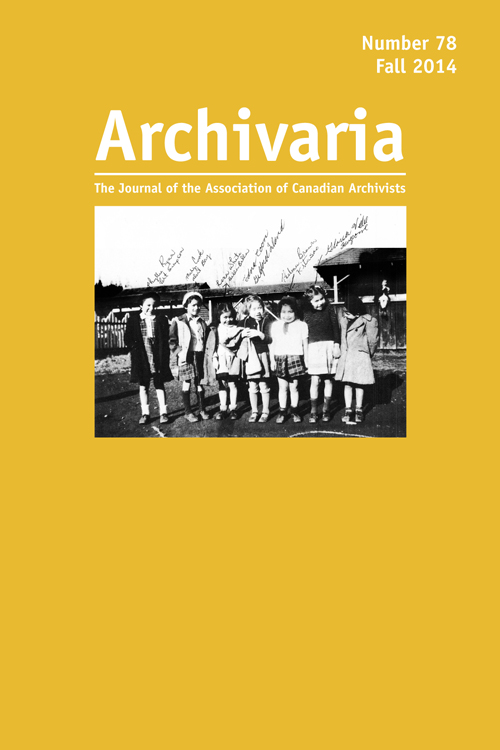A Genre-Based Investigation of Workplace Communities
Résumé
This article discusses various key concepts involved in Rhetorical Genre Studies (RGS) and some of the theoretical frameworks frequently applied by RGS scholars, with the purpose of demonstrating their relevance to the archives and records management domain. By drawing on activity theory, distributed cognition, and situated learning in particular, the article explores the characteristics of professional communication practices, one of the central concerns of RGS. Understanding how organizational actors collaborate, how they construct and reconstruct their collective identities, and how they enact the genres, or cultural tools, that are the outcome and means of their activities is important to situate records creation and use within the actual practices of workplace communities. A genre-based investigation of writing as a complex, multi-functional, and multivocal activity and of learning as a continuous organizational process inherent in the active participation in professional communities will reveal underrated dimensions of record-making, thus contributing to the enrichment of the theory and practice of records management and archives.
RÉSUMÉ
Cet article discute de divers concepts fondamentaux utilisés dans l’étude de la rhétorique des genres ainsi que quelques-uns des cadres théoriques appliqués fréquemment par les spécialistes de la rhétorique des genres, dans le but de montrer leur pertinence dans le domaine des archives et de la gestion de documents. En s’inspirant en particulier de la théorie de l’activité, de la cognition distribuée et de l’apprentissage situé (ou contextualisé), cet article explore les caractéristiques des pratiques de communication professionnelles, l’une des préoccupations principales de l’étude de la rhétorique des genres. Arriver à comprendre comment les acteurs organisationnels collaborent, comment ils construisent et reconstruisent leurs identités collectives, et comment ils donnent force aux genres, ou aux outils culturels (qui sont à la fois le résultat et les moyens de leurs activités), est essentiel afin de situer la création et l’utilisation de documents d’archives dans les pratiques courantes des communautés de travail. Une analyse basée sur le genre de l’écriture comme activité complexe, comprenant plusieurs fonctions et impliquant plusieurs voix, et une analyse de l’apprentissage comme un processus organisationnel continu inhérent à la participation active des communautés professionnelles révèleront l’étendue sous-estimée de la création de documents, contribuant ainsi à l’enrichissement de la théorie et de la pratique de la gestion de documents et des archives.
Authors of manuscripts accepted for publication retain copyright in their work. They are required to sign the Agreement on Authors' Rights and Responsibilities that permits Archivaria to publish and disseminate the work in print and electronically. In the same agreement, authors are required to confirm that "the material submitted for publication in Archivaria, both in its paper and electronic versions, including reproductions of other works (e.g. photographs, maps, etc.) does not infringe upon any existing copyright." Authors of manuscripts accepted for publication retain copyright in their work and are able to publish their articles in institutional repositories or elsewhere as long as the piece is posted after its original appearance on archivaria.ca. Any reproduction within one year following the date of this agreement requires the permission of the General Editor.





